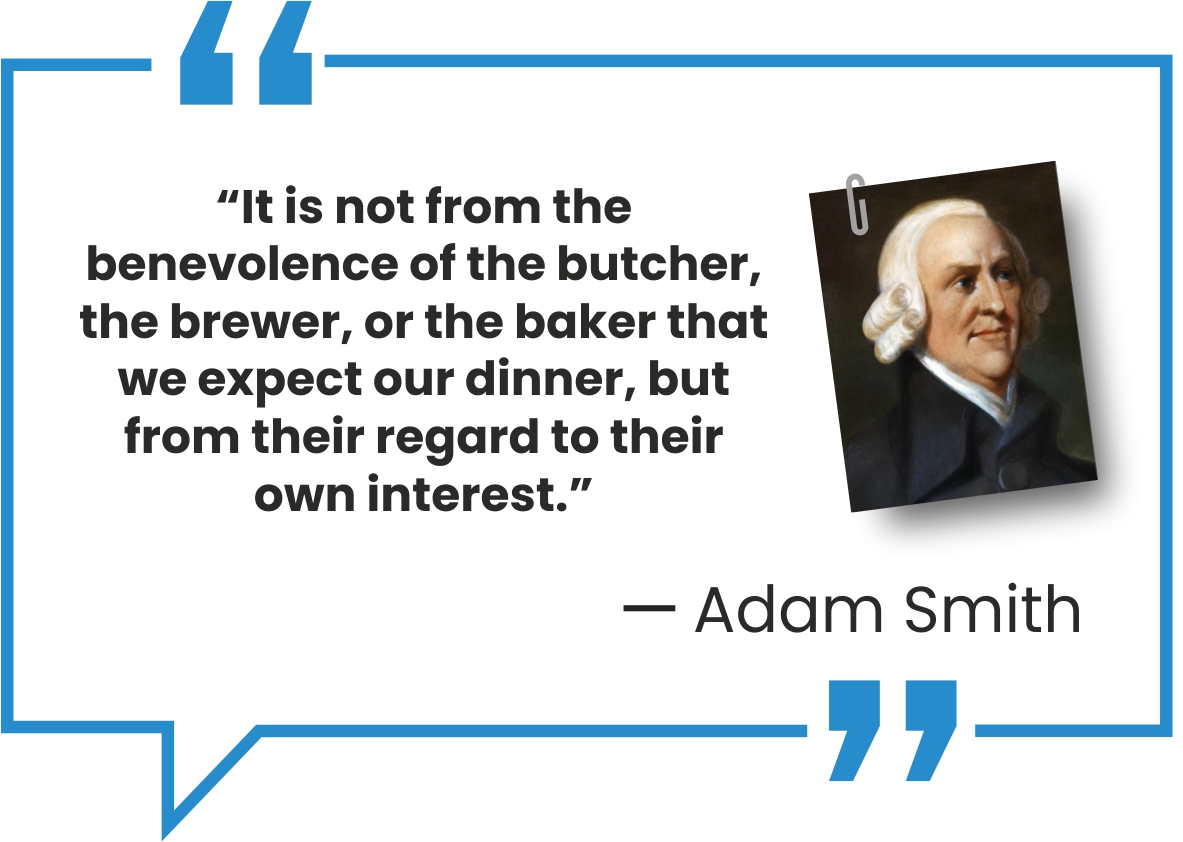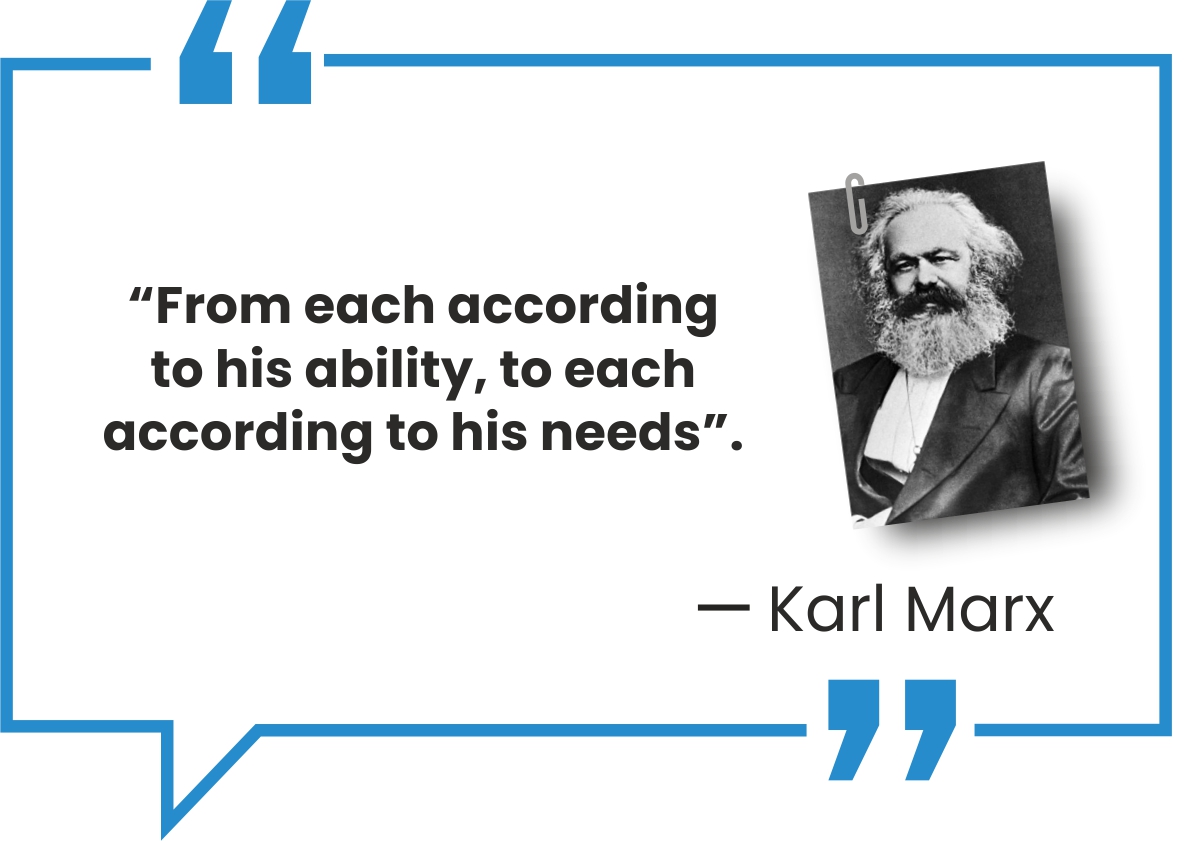Introduction
Recently, Narayana Murthy raised concerns about the large gap in income between top executives and lower-level employees in Indian companies and called for practicing compassionate capitalism to solve this issues. A report by Wealth inequality lab found that in India, the top 1% of income earners received 22.6% of the national income in 2022-23. There was also a report that Amazon warehouse workers were denied bathroom breaks or water until they met certain quotas for the day. These examples highlight the need to re-examine conventional capitalism.

About Compassionate Capitalism
- Capitalism is an economic system where private actors own and control property in accordance with their interests, and demand and supply freely determine the prices in markets in a way that can serve the best interests of society.
- Adam Smith's "The Wealth of Nations" laid the foundations of capitalist thinking.
- According to him, both parties to a voluntary exchange transaction have their own interest in the outcome, but neither can obtain what he or she wants without addressing what the other wants.
- It is this rational self-interest that can lead to economic prosperity. Compassionate capitalism aims to blend capitalist opportunity with principles of equitable wealth distribution from socialist thought.

- Compassionate capitalism merges Adam Smith's economic individualism with the socialist paradigms of Karl Marx.
- It combines the concepts of communism's equitable wealth distribution with the principles of work, opportunity, and fair economic compensation.
- Thus, Compassionate Capitalism can be defined as "equal access for all to unlimited economic growth opportunities" and that also helps others within the same process to achieve personal and collective rewards.
Comparison between the underlying principles of Capitalism and Compassionate Capitalism
Principles | Capitalism | Compassionate Capitalism |
Wealth | Concentration of Wealth (perpetuates in equality) | Redistribution of Wealth |
Profit | Profit to the Business | Profit to all Stakeholders |
Resource | Exploitation of Resources | Sustainable use of Resources |
Social Responsibility | No accountability towards society | Accountability to society for their decisions and actions. |
Contribution of Moral Thinkers to the idea of Compassionate Capitalism
Various moral philosophers have laid foundations that underpin the principles of compassionate capitalism. The diverse philosophies emphasize human dignity, societal welfare, environmental sustainability - values aligning with compassionate capitalism's goal to balance financial success with ethical responsibility to stakeholders.
- Buddhism's Pratityasamutpada: Based on the concept of dependent origination (Pratityasamutpada), this view holds that people are interdependent with each other and the Earth.
- It promotes shared prosperity in a sustainable world with minimal suffering.
- Immanuel Kant's Categorical Imperative: Kant emphasized treating every person as an end in themselves, not merely as means. His moral law dictates acting out of duty to ethical rules, not mere self-interest.
- Gandhian Thought: Gandhi ji's truth, non-violence, and socio-economic ideals included simple living, uplifting all (sarvodaya), and trusteeship.
- Amartya Sen's Capability Approach: Sen's framework evaluates individual well-being and social policies based on people's capabilities and freedoms, not just monetary metrics.
- This provides an alternative to pure profit-driven approaches.
Practices that make Capitalism Compassionate towards various stakeholders
Stakeholders | Practices |
Workers |
|
Environment |
|
Society |
|
Ethical dilemma associated with compassionate capitalism
- Employee Welfare vs. Profit Maximization: Ensuring fair wages, reasonable working hours, and good working conditions may increase operational costs, potentially reducing profits.
- Consumer Interests vs. Profit-Driven Products: Producing higher-quality, safer products may result in higher costs, impacting profit margins.
- Environmental Responsibility vs. Cost Efficiency: Businesses might struggle to balance eco-friendly initiatives with maintaining competitive pricing and profitability.
- Attracting talent in higher echelon Income Equality: Competitive compensation packages are argued to attract top talent even though they can create a significant income gap between the highest and lowest earners.
- Community Engagement vs. Shareholder Returns: Investing in community projects and social causes can enhance a company's social responsibility image but might not provide immediate financial returns to shareholders.
Way Forward
Business is the most pervasive and influential force on the planet today. Its activities transcend national and international borders. Its activities are not unduly constrained by financial, political, cultural, ethnic, or religious concerns. The net of this is that business, as a prevalent and important force, has a moral responsibility to guide, enhance, value, and nourish the existence of all that it encounters.
The true purpose of business is to uplift the experience of existing. As tradition Capitalism does not appear to be helpful in meeting this cherished objective there is need for moving towards Compassionate Capitalism. The idea has been in renewed focus but its seeds exist in our Constitution as well-Article 38 and Article 39 (C). These articles guide State to minimize the inequality of Income and concentration of wealth.
Check your Ethical AptitudeYou have recently joined as a Supply Chain Manager in a leading multinational company that deals with paper production. Your company is making huge profits and receiving significant investments from government and private investors. However, after a scrutiny of the company's operations, you found out that much of your raw material is illegally sourced from the forests of poor African countries. Further investigation brought you to the conclusion that the sourcing of raw materials is done post severe deforestation along with the displacement of the traditional tribal communities that reside and depend on them. Upon discussing these findings with your colleagues, you realized that reporting or voicing against the companies' practices would be retaliated by way of providing harsh work conditions ultimately leading to lay-off and tarnishing your image in the corporate fraternity to restrict further employment opportunities. You are the sole bread winner of your family and personal circumstances do not allow you to your job. On the basis of the case study answer the following questions:
|



